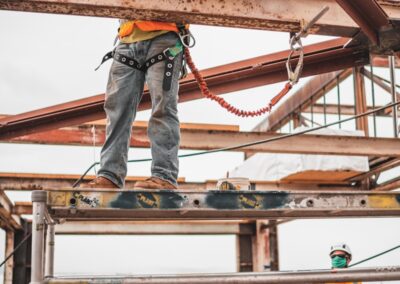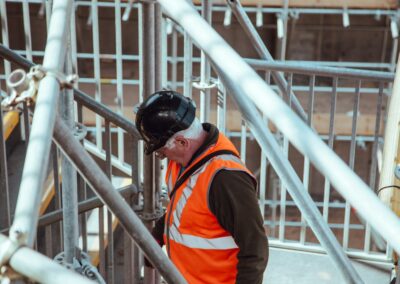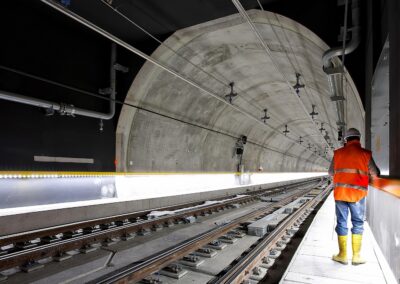Leveraging Virtual Models and Simulations for Effective Project Management
The Role of Digital Twins in Construction Efficiency
Digital twins in construction efficiency are transforming the construction industry by providing detailed virtual models and simulations that enhance project management and execution. A digital twin is a dynamic, digital representation of a physical asset, process, or system. In construction, this technology enables real-time monitoring, predictive analysis, and strategic decision-making, significantly improving the efficiency and effectiveness of projects.
Digital twins integrate data from various sources, including BIM (Building Information Modeling), IoT sensors, and historical project data, to create comprehensive and accurate virtual models of construction projects. These models allow project managers to visualize the construction process, identify potential issues, and optimize workflows before physical work begins. By simulating different scenarios, digital twins help in anticipating challenges and devising effective solutions.
In regions like Saudi Arabia and the UAE, where large-scale construction projects are common, the implementation of digital twins can bring remarkable improvements in project outcomes. Cities such as Riyadh and Dubai are investing heavily in smart infrastructure, making them ideal environments for adopting advanced technologies like digital twins. By integrating digital twins into their construction management practices, these regions can set new standards for efficiency, sustainability, and project success.
Improving Efficiency with Detailed Virtual Models
The use of digital twins in construction efficiency provides numerous benefits through detailed virtual models that offer a precise and comprehensive view of the entire project. These models encompass every aspect of the construction process, from design and engineering to execution and maintenance. By having a detailed and dynamic representation of the project, stakeholders can make more informed decisions and ensure that all aspects of the construction are aligned with the project’s goals.
For instance, digital twins can provide detailed visualizations of structural components, electrical systems, and plumbing installations. This holistic view allows project managers to detect and address potential conflicts or issues before they arise, reducing the risk of costly rework and delays. Moreover, digital twins enable better coordination among architects, engineers, and contractors, ensuring that everyone is on the same page and working towards the same objectives.
In Saudi Arabia and the UAE, where construction projects often involve complex designs and advanced technologies, digital twins can enhance the accuracy and reliability of project execution. By incorporating this technology into their practices, these regions can improve the performance and quality of their construction projects, ultimately leading to better outcomes for all stakeholders involved.
Enhancing Effectiveness with Predictive Simulations
The implementation of digital twins in construction efficiency also facilitates predictive simulations that can significantly enhance the effectiveness of project management. Predictive simulations involve using data analytics and machine learning algorithms to forecast future outcomes and identify potential risks before they become critical. This proactive approach allows project managers to plan more effectively and mitigate risks in advance.
For example, digital twins can simulate the impact of different environmental conditions, such as weather changes or seismic activity, on the construction project. By analyzing these simulations, project managers can develop contingency plans and ensure that the project remains on track regardless of external factors. Additionally, digital twins can predict equipment failures or maintenance needs, enabling timely interventions that prevent downtime and keep the project on schedule.
In the context of construction management in Saudi Arabia and the UAE, predictive simulations supported by digital twins can improve the resilience and reliability of projects. By implementing this technology, project managers can optimize their strategies, allocate resources more effectively, and reduce the overall risk of project failure. This strategic approach to project management can enhance the sustainability and success of construction projects, ultimately benefiting the broader built environment.
Strategic Implementation for Project Success
Successfully implementing digital twins in construction efficiency requires a strategic approach that combines technological innovation with project management expertise. This involves selecting appropriate digital twin platforms, ensuring interoperability with existing systems, and training project managers and construction professionals to utilize the technology effectively.
Executive coaching and leadership development are essential components of this process. Business leaders must champion the adoption of digital twins, drive innovation, and foster a culture of continuous improvement within their organizations. By investing in leadership development, construction firms can ensure that their teams are well-equipped to leverage digital twins for maximum impact.
In regions like Riyadh and Dubai, where there is a strong focus on modernization and technological advancement, the strategic implementation of digital twins can significantly contribute to project success. By aligning technological innovations with leadership and strategic vision, these cities can set new standards for construction management and enhance the efficiency and sustainability of their projects.
Conclusion
In conclusion, digital twins in construction efficiency offer transformative benefits for enhancing the effectiveness and efficiency of construction projects. By providing detailed virtual models and predictive simulations, digital twins enable better project planning, real-time monitoring, and proactive risk management. As regions like Saudi Arabia and the UAE continue to embrace modern technology, the integration of digital twins will play a pivotal role in advancing construction management practices. Through strategic implementation and strong leadership, businesses can harness the full potential of digital twins to achieve greater efficiency, precision, and success in managing construction projects.
—
#DigitalTwins #ConstructionEfficiency #VirtualModels #Simulations #AIinConstruction #SmartBuildings #SaudiArabia #UAE #Leadership #BusinessSuccess #ProjectManagement























